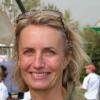The Rangelands Initiative of the International Land Coalition (ILC) is drawing attention to rangelands and drylands at the highest levels, in order to find solutions to the challenges faced by local populations that live and work there, and to encourage appropriate investment including in securing land rights and good governance, building resilience to drought and other shocks or stresses, and increasing rangeland productivity.
As part of this effort, in September the Rangelands Initiative hosted a panel Drylands and Rangelands: Harnessing Change at the Global Landscapes Forum (GLF) New York, organized as a starting point for planning the UN Decade of Ecosystem Restoration, which will be launched in 2021. This decade is a global call to action that aims to draw together political support, scientific research and financial muscle to massively scale up restoration from successful pilot initiatives to areas of millions of hectares.
The aim of the drylands and rangelands session was to highlight important issues and opportunities related to restoration of rangelands and drylands. The dearth of good data on rangelands and drylands was highlighted as well as the lack of investments in rangeland restoration, particularly when compared to forests.
Real-life solutions on rangeland restoration were presented, together with the potential they offer in terms of improving the environment and local livelihoods. The role of land tenure security and good governance was stressed, along with how initiatives such as the call for a UN International Year of Rangelands and Pastoralists provide opportunities to address such issues.
The panel took the audience on a journey to different parts of the world to hear pastoralists and other land users describe their efforts to restore the rangeland and dryland landscapes upon which they depend. Their success stories were encapsulated in three films:
- A Common Right, Mongolia, introduced by the assistant to H.E. Mr Sukhbold Sukhee Permanent Representative and Ambassador to the UN
- Pasture Improvement and Paddocking in Cameroon, introduced by Umar Sule, a Mbororo pastoralist from Cameroon and member of MBOSCUDA (Mbororo Social and Cultural Development Association)
- Chihuahuan Desert Grasslands of Mexico, introduced by Gabriel Seghezzo of Fundapaz Argentina and the coordinator of the Semi-Arids Platform, providing a potential solution to addressing the significant loss of global birdlife including In North America in recent years.
In the session’s closing remarks, Paola Agostini of the World Bank (WB) highlighted several initiatives where the bank is supporting rangelands and drylands including the TerrAfrica/WOCAT guidelines to sustainable rangeland management practices and the recently launched ECCA30 initiative, which seeks to restore 30 million hectares of degraded land in Europe, the Caucus and Central Asia. Rangeland management is good for alleviating poverty sharing prosperity, and for climate-friendly development, explained Agostini. She went on to say that now is the time to scale up good practices in rangeland restoration and invest in strategic partnerships, including platforms, research organisations, communities and others.
Learn more:
Event highlights from the Global Landscapes Forum New York 2019: Restore the Earth
Drylands and Rangelands: Harnessing Change session and speakers
A 5-minute starter on rangelands and why they matter Blog post, Global Landscapes Forum
A Month, a Year and a Decade in Support of Sustainable Rangelands and Pastoralism Blog post, Global Landscapes Forum
The drylands and rangelands session at the Global Landscapes Forum in New York was co-sponsored by the Rangelands Initiative and the CGIAR Research Program on Livestock as part of its ongoing research work on rangelands and pastoralism. We thank all donors who support the program’s work through their contributions to the CGIAR Trust Fund.


